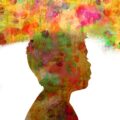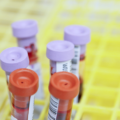As a child, I endured every form of abuse. Both of my parents were mentally and emotionally abusive. I was beaten and experienced two severe head injuries that were never treated. One incident involved falling head first out of a moving vehicle. My brother grabbed my legs, but my head hit the pavement several times before he was able to pull me back in. The other incident was being thrown onto my parents’ waterbed and hitting the sharp corner of the bed frame.
I was sexually abused starting at the age of three.
I had my first period in third grade. My periods were painful with heavy flows that also came along with depression and anxiety. I was put on birth control at the age of 12 to try and control the menstrual symptoms.
At the age of 12, I was prescribed Prozac for the depression and within a couple of weeks of starting the medication, I had my first suicide attempt. Over the next 20 years, I was placed on almost every psychiatric drug there is – always resulting in a suicide attempt or a worsening of symptoms.
In high school, I started getting terrible headaches and went to a chiropractor for a few years. That chiropractor said that my neck curves the wrong way possibly caused by the head injuries as a child.
Also, in high school, my bladder started causing me a lot of distress. I pee a lot. Yes, women say they pee a lot. To this day I pee upwards of 30 times a day. The urologist in my hometown performed one of the most painful tests I have ever endured. They pumped me full of saline and waited until my bladder was full. I was in tears when it got to halfway full. Then they took x-rays as I tried to pee into a cup. The result was a diagnosis of overactive bladder. He said that my bladder was very strong, that when any urine hit my bladder it would spasm giving the feeling of needing to pee.
The menstrual issues continued to get worse. I would be debilitated during my periods. In my early 20s, we ran more tests on my bladder. They diagnosed me with interstitial cystitis and said that I had little to no capacity in my bladder. I cut back on caffeine and acidic drinks and /foods and upped my water intake.
Around this same time, I had a mental and emotional breakdown after a confrontation with my father. I was diagnosed with PTSD and went through EMDR therapy with great results.
In my mid-20s we did a laparoscopic surgery to determine why I was still having so many problems with menstruation and was told I had an excessive amount of blood vessels on my uterus. I was told that having children should help alleviate the symptoms. They sent me home before I was able to go to the bathroom. This led to one of the most painful nights I have ever had because I could not pee. I just sat on the toilet and cried. We went back to the hospital and they inserted a catheter and were bewildered. I was outputting way more than I was inputting. The doctors had no clue why this was happening or what could be done. Once I was able to urinate without the catheter, I was sent home and no further tests were run.
After a divorce and the death of my step-father, I married an abusive man. I had another breakdown and he had me institutionalized. While I was in the hospital they diagnosed me with Fibromyalgia. They put me on a cocktail of 40mg of Lyrica, Xanax, Valium, Trazadone, and Paxil. I was a zombie and within 3 weeks, I took all the pills in another suicide attempt. I was in the ICU for three days and came out a stronger person. I divorced my then husband and moved to the east coast.
I get regular sinus infections and bronchitis. I struggle with both falling and staying asleep. I have an amazing toolkit for managing anxiety and depression.
In 2010, during an MRI they discovered that I had 4 small nodules (under 1cm) on my thyroid. They diagnosed me with multinodular goiter.
I got pregnant in September of 2011 and it was brutal pregnancy. I ended up in the hospital with dehydration because I could not even keep water down. Thankfully Zofran helped me survive my pregnancy. I had a c-section in June of 2012 because I would not dilate. I was induced and after almost 48 hours of labor, I had only dilated ½ cm. I experienced severe postpartum depression but pushed through without medication.
In 2014, I got pregnant again and had another brutal pregnancy. I had gestational diabetes and was monitored closely. I had another c-section in August of 2014 followed by the worst infection I have ever endured. I went through five rounds of oral antibiotics and two weeks of IV antibiotics before the infection cleared up. Over the next few months, my husband and I became concerned with the increase in my bowel movements and swollen stomach. I saw a GI and he said it was most likely IBS and to try an elimination diet. I did and proceeded to lose 65 lbs. I cut out corn, wheat, rice, and only had minimal dairy. I also began working out regularly as well to improve my health. While this was going on I also started having increased pain with menstruation. I bled for three months non-stop. I saw several GYNs with no answers or help provided. I finally found an amazing GYN that discovered I had fibroids and cysts and we decided to try a partial hysterectomy. They removed my uterus and cervix in March of 2016. I had severe endometriosis and had scar tissue wrapped around my intestines. After surgery, I had another mental breakdown and he then regretted not taking my ovaries. He said he believed I have PMS disorder.
I also started to experience worsening headaches during this time but was able to manage with Tylenol, rest, etc. I was having significant shoulder and neck pain and my primary care doc ordered an MRI in August 2016 and we then discovered I had 9 thyroid nodules, two of which were over 1 cm in size. They were biopsied and found to be benign.
I broke my ankle in October of 2016 (first bone I have ever broken and had surgery to install a plate and six screws into my right ankle). I have permanent nerve damage and tendinitis in that ankle now. During the recovery from my ankle surgery, I noticed a high pitched and very loud ringing in my right ear. I was having difficulty hearing and felt very off balance (more so than usual). In January 2017, I went to an ENT and we discovered I have lost roughly 50% of the hearing in my right ear. They said it was Idiopathic Sudden Sensorineural Hearing Loss and I got a hearing aid to help. They performed an MRI and I was told there were no significant findings. I began having severe facial pain, headaches, and migraines. I began having severe issues sleeping. For almost a month, I was only averaging 3-4 hours of sleep a night and then went almost a full week with no sleep. I went to my primary care and she told me there was nothing she could do for insomnia and head pain but would treat the sinus infection I had with prednisone. This led to an acute psychotic break.
Over the next few weeks, I advocated for myself and made an appointment at a neurologist’s office and found a new primary care doctor. The nurse at the neurologist office I saw prescribed Imitrex. Which led to another adverse reaction and another hospitalization.
My new primary care doc ordered a CT scan of my sinuses and it appears I have a deviated septum with some sinus thickening. I went and saw an ENT and he advised me that I needed a competent neurologist but did not refer me to one.
A headache that began in January of 2017 continued with increased migraines. I began seeing a psychologist and learned mindfulness and cognitive behavioral therapy techniques. We did some neuro-biofeedback and EMDR.
The verdict is always the same – “this is complex” or “it’s all very biochemical”. We tried some blood pressure medication to help me sleep as well as some antipsychotics, but the side effects were worse than coping on my own.
We did a colonoscopy in July 2017, to investigate the stomach pain and distension I continue to have. While lying down I can often see the movement of my intestines. Looks like a baby moving around in my belly. The stomach distension comes and goes. Some days it’s normal and other days I look 6+ months pregnant. I also struggle with constipation and diarrhea. The GI specialist said that I had reflux but no other significant findings.
October of 2017, I saw the neurologist and he recommended Botox and neuro-biofeedback. I took a brain test on a computer and he did not perform any other tests. My GYN tried putting me back on birth control pills to see if the estrogen would help level me out. The results were BAD!!! I had an oophorectomy in December 2017. For a few weeks after the surgery, there was an improvement. I still had a never-ending headache, but migraines were less, and I felt strong enough to push through the head pain. Then it all came back with a vengeance. We lowered the estradiol from 1mg to .5mg and the neurologist gave me a sedative to try and break the migraine cycle. It helped but was brutal. The medication made me very suicidal and paranoid, but I pushed through!
After doing research on the Botox, I decided I did not want to proceed with that treatment.
I had a bit of a reprieve from the migraines after adjusting the estradiol and was just managing the headache. We did another thyroid ultrasound last month and there was significant growth on one of the nodules. They biopsied the largest nodule and it came back benign again.
Last week the migraine came back. We did two shots of 30mg of Toradol. It was better for a couple days and then came back again. We are going to shorten the time between changing the estradiol and see if that helps. I am researching and trying to find a headache clinic at the recommendation of my primary care. I practice self-care regularly and fight through a headache, joint pain, constant bladder pain and anxiety as best I can. I haven’t had a headache free day since January 2017. Please help.
Family History of Cancer:
Maternal Grandmother: Colon Cancer
Mother: Breast Cancer, Colon polyp that was removed w/ surgery
Father: Skin Cancer
Sister: Hodgkin’s Lymphoma Lung Cancer (age 14 – in remission)
Brother: Bile Duct Cancer (passed away in 2011)
We Need Your Help
More people than ever are reading Hormones Matter, a testament to the need for independent voices in health and medicine. We are not funded and accept limited advertising. Unlike many health sites, we don’t force you to purchase a subscription. We believe health information should be open to all. If you read Hormones Matter, like it, please help support it. Contribute now.
Yes, I would like to support Hormones Matter.

















